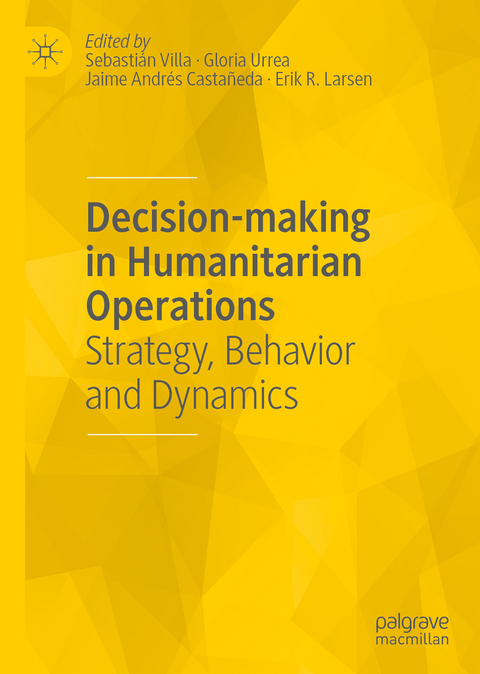
Decision-making in Humanitarian Operations
Springer International Publishing (Verlag)
978-3-319-91508-1 (ISBN)
- Provides a holistic view of decision-making processes in the humanitarian sector
- Discusses the main strategic challenges faced by various actors when facing humanitarian crises
This book brings together research in three different streams: humanitarian operations, behavioral operations and dynamic simulation. Part I gives an introduction of the humanitarian sector, outlining the main characteristics and strategic challenges of humanitarian organizations in preparedness, knowledge management, climate change and issues related to refugees and social inclusion. Part II starts with an introduction to behavioral operations and experiments in both single- and multi-agent settings, followed by discussions on quantal theory, framing effect and possible applications in the humanitarian sector.
Part III introduces system dynamics and agent-based modeling and discusses how these modeling techniques can be used to study dynamics and decision-making in humanitarian operations, with a special focus on disaster management problems, collaborative strategies in humanitarian logistics and supply chains with heterogeneous decision makers. This book is unique in providing a holistic view of the decision-making process and challenges in the humanitarian sector.
Sebastián Villa is Assistant Professor in the School of Management at the University of Los Andes, Colombia.
Gloria Urrea is a visiting researcher at the Kelley School of Business, Indiana University, USA, and a Ph.D. candidate at Università della Svizzera italiana (USI), Switzerland.
Jaime Andrés Castañeda is Principal Professor in the School of Management at the University of Rosario, Colombia.
Erik R. Larsen is Professor in the Department of Management, School of Business and Social Sciences, Aarhus University, Denmark.
PART I
Chapter 1
Logistics Preparedness and Response – A Case of Strategic Change
By: Marianne Jahre and Martine Jahre
Chapter 2
Private Donations for Humanitarian Operations
By: Gloria Urrea and Alfonso J. Pedraza-Martinez
Chapter 3
Strategy and Knowledge Management in Humanitarian Organizations
By: Margarita Cruz and Achim Schmitt
Chapter 4
Innovating Short-Term Preparedness Actions using Climate Information
By: Gloria Urrea and Meghan Bailey
Chapter 5
Refugees and Social Inclusion – The Role of Humanitarian Information Technologies
By: Sonia Camacho, Andrea Herrera and Andrés Barrios
PART II
Chapter 6
Behavioral Experiments in Single-Agent Operational Problems
By: Jaime Andrés Castañeda
Chapter 7
Behavioral Operations in Multi-Agent Settings and Humanitarian Operations
By: Sebastián Villa
Chapter 8
Quantal Theory in Operations Management
By: Yefen Chen and Yanan Song
Chapter 9
The Framing Effect in Humanitarian Operations
By: Jaime Andrés Castañeda
PART III
Chapter 10
Modeling Disaster Operations Management problems with Systems Dynamics
By: Carlos A. Delgado-Alvarez and Yris Olaya
Chapter 11
Collaborative Strategies for Humanitarian Logistics with System Dynamics and Project Management
By: Diana Carolina Guzmán-Cortés, Leonardo José González-Rodríguez and Carlos Franco
Chapter 12
Agent-Based Modeling in Humanitarian Operations
By: Luisa Díez-Echavarría, Karthik Sankaranarayanan and Sebastián Villa
Chapter 13
Effects of Wholesale Competition in Supply Chains: An Analysis with Heterogeneous Decision Makers
By: Santiago Arango-Aramburo and Yuly Arboleda
| Erscheinungsdatum | 08.12.2018 |
|---|---|
| Zusatzinfo | 22 illus. |
| Verlagsort | Cham |
| Sprache | englisch |
| Maße | 148 x 210 mm |
| Gewicht | 575 g |
| Themenwelt | Wirtschaft ► Allgemeines / Lexika |
| Wirtschaft ► Betriebswirtschaft / Management | |
| Schlagworte | behavioural operations • collaborative strategy • Disaster Relief • knowledge management • Modelling • Operations Management • Strategy • Supply Chain • sustainability • System Dynamics |
| ISBN-10 | 3-319-91508-8 / 3319915088 |
| ISBN-13 | 978-3-319-91508-1 / 9783319915081 |
| Zustand | Neuware |
| Informationen gemäß Produktsicherheitsverordnung (GPSR) | |
| Haben Sie eine Frage zum Produkt? |
aus dem Bereich


